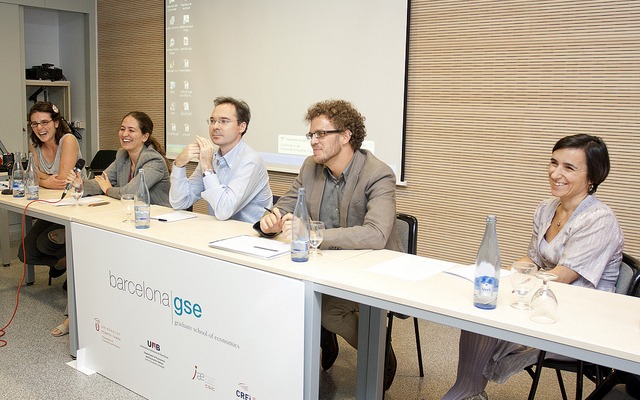community
Four professors discuss immigration economics at BSE Trobada IX

At the BSE "Trobada" faculty present their latest research to the Barcelona economics community
The ninth edition of the BSE "Trobada" took place on October 21, 2011 at the Institute for Economic Analysis (IAE-CSIC) on the Bellaterra Campus (UAB). The "Trobada" is a yearly academic gathering of BSE affiliated professors and external research fellows, providing the opportunity to share new developments and research in progress across different areas.
As in years past, the highlight of this event was the afternoon roundtable discussion. This year's roundtable, chaired by Prof. Ada Ferrer (IAE and BSE), focused on "The Importance of Migration Flows," and examined economic factors contributing to immigration, immigration's impact on the economy, and the public policies that are designed around it.
The macro perspective
"It's hard to overemphasize the importance of migration and its impact on the economy," Prof. Gino Gancia (CREI and BSE) said during his roundtable discussion examining immigration from a macroeconomic perspective. He noted that there are still many more questions than answers when it comes to determining the benefits of migration. "Who gains from migration? The destination country? The country of origin? The biggest gainers are the immigrants themselves," he said.
Labor and housing markets
Prof. Libertad González (UPF and BSE) pointed to the case of Spain, where labor markets and housing markets have fluctuated together with periods of intensive immigration into the country. "In Spain, migration flows have responded to economic conditions, rather than driving them," she found in her research.
Complementing the research on the Spanish case, Prof. Núria Rodríguez (UAB and BSE) examined the country's "friendly" immigration policies during different periods of its recent history. She also suggested designing policies that add flexibility to the Spanish labor market. "Policies that add flexibility will most likely enhance an efficient allocation of labor," she said. As an example, she mentioned the case of architects with credentials from other EU countries but cannot use their foreign credentials to access jobs in their profession.
Sorry voters, immigrants are people, too.
Prof. Francesco Fasani (IAE and BSE) put an economist's spin on an instructive quote from Swiss writer Max Frisch: "We wanted workers, and we got people."Prof. Fasani used this phrase to describe the attitudes of voters regarding immigration policy. Voter attitudes boil down to concerns about perceived labor market competition, fiscal impact, socio-cultural and identity issues tied to immigration.
Prof. Fasani pointed out that these perceptions do not always match up with a country's economic reality and that they ultimately create mixed incentives for officials: pleasing the electorate with restrictive immigration policies, while providing the workers needed to keep the economy running by enforcing those policies loosely when the economy requires additional cheap labor.
Research presentations:
"What drives matching efficiency in the labor market?" Prof. Régis Barnichon |
"Labor market participation, unemployment and monetary policy" Prof. Stefano Gnocchi |
"Macroprudential Policy, Countercyclical Bank Capital and Credit Supply: Evidence from the Spanish Dynamic Provisioning Experiments" Prof. José-Luis Peydró |
"Technologies of Rebellion in Civil War" Prof. Laia Balcells |
